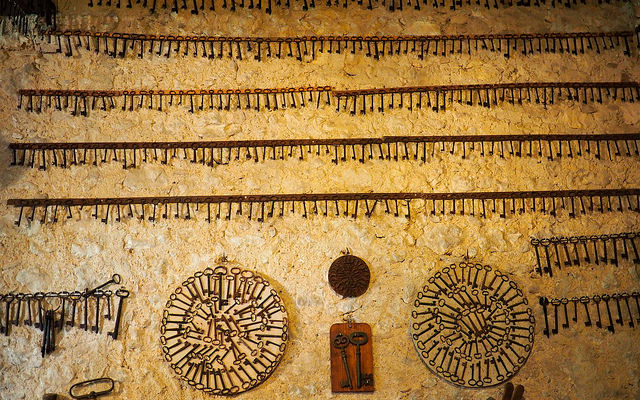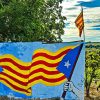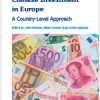
The Catalan pro-independence movement is broad and heterogeneous. Its glue is a formidable idea: the sentiment of having the chance to build a new country from scratch. It is like having a blank sheet in front of your eyes and filling it with one’s dreams and desires. The petite bourgeoisie (in general the upper bourgeoisie does not support independence, doing well both within Spain and the EU) hopes to gain more influence to so that regulations from the new state can be designed more to its advantage; those in the liberal professions, along with some well-respected Economics professors such as Xavier Sala-i-Martin, think they will have a less bureaucratic and corrupt administration and lower taxes, as in Switzerland; left-wing nationalists believe they can build a more developed welfare system and make Catalonia similar to Denmark; farmers hope to gain more social recognition and a better status; and anarchists and anti-capitalists (who supported the Catalan government in order for Puigdemont to gain the majority he needed in Parliament and drove most of the radical agenda) dream of a communist utopia. Yes, you have read it right: the petite bourgeoisie and the anti-capitalists and anarchists are on the same boat. Very odd indeed, but ample testimony to the strength of a movement backed by more than 2 million people.
Overall, the buzzwords are: regain sovereignty and take back control. Or in this case, gain sovereignty and independence –in the modern sense of the words– for the first time, since Catalonia was formerly united to the Kingdom of Aragon before the latter became subsumed with the Kingdom of Castile in what is now Spain. This explains the desire to break free and to insist on harping on the repression suffered during the Franco dictatorship, when speaking Catalan was banned or frowned upon and Madrid ruled the region by stealth. This sense of oppression and grievance has developed into a victimistic pathology based on a number of myths, debunked by Xavier Vidal-Folch and Ignacio Torreblanca. One of these myths is that Spain is an authoritarian regime that operates under ‘rule by law’ and not the ‘rule of law’, which is complete nonsense.
Another is that an independent Catalonia would continue to be member of the European Union. In other words, that there would be no costs associated with independence. Here the Catalan government, like Tsipras and Varoufakis before, shows that it does not understand how power works in the EU. The European Council, formed by nation-states, will never side with a region that rebels against another member state. This would establish a dangerous precedent and go against the spirit of an ever-closer union. A different proposition would be for Scotland to leave the UK and ask for accession once the latter breaks away from the EU. The power dynamics are very different.
The sad story is that on the basis of all these unfounded myths and grievances a minority of radicals and fanatics have brought Catalonia to the brink, creating a heightened level of social tension in Catalonia, to the point where Spanish journalists feel harassed and intimidated (as in the account by David Alandete). Following the 2015 elections, the radicals had a majority in the Catalan Parliament –made up of the heterogeneous coalition described above– but were lacking a majority of the vote (due to the fact that rural areas are overrepresented compared with less independence-minded urban areas). This important detail was irrelevant 6-7 September, however, when the Parliament approved the two so-called laws of disconnection (the binding referendum of 1 October and the transition to independence). This was not only illegal but also illegitimate and arguably even undemocratic. Not only did it contravene the Spanish Constitution, making the entire process illegal according to Spanish law, but it also negated the normal reform procedures of the Catalan Statute itself. Legally, to reform the Statute or even to undertake substantial decisions of regional importance, such as appointing and dismissing the director of the Catalan public broadcasting system, it is necessary to have a two-thirds majority. The independence movement had only a small majority but pushed through regardless.
For many casual watchers around the world the feeling is that the Catalans just want to vote and that Madrid is preventing them. When the public saw footage of riot police beating voters at polling stations, it clearly sided with the Catalan cause. The police violence of that day was certainly unfortunate, and in some cases disproportionate, but it was also the result of the Catalan regional police not halting the process in the months and weeks before the poll. It is generally assumed that voting is very democratic, but if it is not legitimate it can be profoundly anti-democratic. If one were to bring together a large number of residents in a neighbourhood and convince them to hold a referendum on whether to make the area car-free, organising a vote and declaring that if the majority were to vote ‘yes’ the streets were to be closed to traffic, the result could be the proclamation of a small independent car-free republic. It is obvious that if ballot boxes were to be placed in the middle of the street, the police would soon show up and counter the ‘right to decide’ by a legitimate use of force, should that be necessary. Accusations of this action being ‘fascist, undemocratic and contrary to basic human rights’ would surely follow. The example is absurd but pretty much sums up the situation.
The acronym in Spanish for ‘unilateral declaration of independence’ is DUI. This is what the Catalan government finally did on 27 October 2017. DUI in the US is short for ‘driving under the influence’, either of alcohol or drugs. The simile is somehow very apt: a mass campaign of propaganda and fake news has intoxicated many in Catalonia to believe that the region would soon be independent. Apparently, some even believed that in the weeks following DUI they would receive Catalan passports. Not even Don Quixote’s author Miguel de Cervantes or the dramatist Valle-Inclán could devise something as absurd, for which there is a very Spanish word, esperpento, implying something grotesque and fantastical.
Fortunately, the nationalist dream is beginning to fade and reality is kicking in. Major companies have moved their HQs out of the region, the economy is starting to be penalised due to the independence folly, Puigdemont’s flight to Brussels has been portrayed in the international press as a circus, none of the EU’s 27 governments support the Catalan cause and neither does the US, and certainly not Beijing. So, gradually, many supporters of independence are beginning to doubt whether it was all a good idea in the first place. Splits are appearing in the broader independence movement. It appears that the centre-right PDeCAT will not run jointly with the more radical left-wing republican ERC in the elections scheduled for 21 December. In many ways, although they may have some martyrs in gaol, it will be difficult to convince people again that independence is possible. Somehow the desert has been crossed but no water has been found on the other side.
Soon enough the efforts in Spain will not be directed at halting this collective suicide attempt but rather at focusing on how to heal the wounds and repair the rifts in Catalan society. A task as Herculean as finally completing Barcelona’s cathedral of La Sagrada Familia. Many believe that a legal, agreed referendum on secession would do the trick. That is what happened in Scotland and Quebec and the result was satisfactory, which is why almost 80% of Catalans want to vote. As I have said, for a time I was sympathetic to the idea, but no longer. As Pau Marí-Klose and Ignacio Molina have argued, a referendum would solve nothing. Most Catalans want to vote because they believe they will win, regardless of what side they are on. Given the rift in Catalan society, a win-or-lose binary option would only divide Catalonia even further, leading to a species of Ulster question. I believe the solution is to reform the Spanish Constitution in a way such that it can better embed Catalonia and the rest of regions within the Spanish state. The solution must be federal. The regions could enjoy greater self-management of their taxes, for instance, while the richer ones would still contribute the same amount to the common pot.
If the Catalans as a whole want to be part of the EU – and most do– they need to abide by the principle of solidarity and this means that they need to start within Spain. More autonomy in collecting taxes, though, should be offset with more technical monitoring and supervision from the centre in key areas such as the cohesiveness of the internal market and the avoidance of discrimination and separatist propaganda in the educational system, for example. Here a fine line needs to be drawn. Everyone, teachers included, should have the right of freedom of expression. But if this becomes systematic indoctrination calling for independence and sedition based on hate-mongering, it should be disallowed.
True, reforming the Constitution will not be easy. However, I believe it is the only way forward. Both PP and PSOE have already agreed to a parliamentary commission to do so. It would be important to include the new parties Ciudadanos and Podemos, but also the moderate nationalist parties from Catalonia and the Basque Country, because if not the process would lack legitimacy. In Germany so often the Länder and the Federal government renegotiate the distribution of competences and fiscal balances. They set up a commission and after a couple of years of negotiations a deal is struck. I hope my country can do the same. The 1978 Spanish Constitution was drafted following the German model and even article 155 is taken from it. It is to be hoped that the new reform will also find inspiration in what is a relatively stable (although not perfect) German federalism. The first thing to do is perhaps to establish clearly the distribution of competences. This would stop the current temptation to pull away more competences from Madrid, and avoid the counter-move: attempts from Madrid to re-centralise them.
In many ways the crisis might have a silver lining, or even two. First, it should be a wake-up call for all Spaniards. Spain has come a long way in the past 40 years. It has set up the institutions to build a stable democracy but the time has now come to modernise them. Corruption needs to be fought relentlessly and meritocracy and transparency (and the mechanisms of external evaluation at all levels of the administration) need to be improved. I have never heard so many times in Spain the sentence ‘the law is the law and needs to be respected’ as in the past 12 months. I hope this is now applied in all spheres, from tax evasion to traffic to environmental pollution. Another potential positive outcome is that many Spaniards have again become proud of their flag. The Spanish flag hangs today from thousands of balconies and windows all over Spain, including Catalonia. This has never happened before (except when Spain won the football world cup in 2010, of course). When it comes to politics, the Spanish flag was always associated with right-wing sentiment, or even extreme-right wing Francoist movements. It is good that the Spanish left, and many not politically- or ideologically-driven citizens have started to embrace the flag. If Spain wants to become a modern, advanced democracy, its citizens need to develop a sense of ownership and belonging. They need to sense that they are the state. So far this was in sorely scarce supply.
Another positive outcome might be that the Spanish state, its governments and the elites in Madrid and the rest of Spain might be more inclined to be more present in and more willing to engage with Catalonia. As a foreign ambassador told me recently, how many times have ministers and secretaries of state of the Rajoy government (or Rajoy himself) visited Catalonia in the past five years? If the Spanish state wants to merit the allegiance of the Catalans, it must be more considerate. And this means not only putting more money and infrastructures on the table. Sometimes symbolic gestures can do more than hard cash. Conversely, the Catalan elites should also engage much more with Madrid and the rest of Spain. I am surprised to see so few Catalans in my professional circles in Madrid. I meet people from all corners of Spain but very few Catalans. I see way more Basques than Catalans, for instance. And I do not think that Catalans are being side-lined. Sometimes pro-independence Catalans complain that no Spanish Prime Minister has been a Catalan, but we have only had five in our young democracy and we have 17 regions, so their criticism is unfounded. Catalonia has provided powerful ministers such as Narcís Serra, Josep Borrell and Josep Piqué. The point is: if one wants to be liked, one needs to persuade. And that should be done on both sides.
Finally, returning to my Swiss-Galician-Spanish-European roots. In the new arrangement, after this dramatic crisis, Barcelona will not have a state behind it to compete with Madrid. But this should not be an obstacle for Barcelona to be a vibrant, cosmopolitan and prosperous place. Zürich and Basel are not the capitals of Switzerland but they are precisely that. With the right amount of autonomy, Barcelona can thrive and so can Catalonia. Switzerland does not have a seat at the European Council and it is doing more very well in this globalised world. The Catalan independence movement may well say ‘well, that’s what we want, we want to be like Switzerland’. But the question is: at what price? With what support? And with what legitimacy? After analysing how they have operated in the past few years, how they have tried to organise parallel state institutions completely beyond the legal framework and how they have trampled on the rights of the rest of Catalans and Spaniards (yes, indeed, in my opinion how they have engaged in sedition) my answers to these questions are firm: at a very high price, with very little support and with even less legitimacy. Thus, a call for a binding referendum on independence should not be made in the immediate future. Unfortunately, such an idea has burnt out, and it has been burnt out by its proponents!
[An earlier version of this text was published on Medium.]


